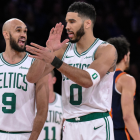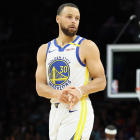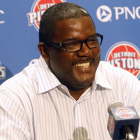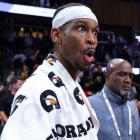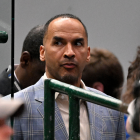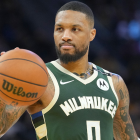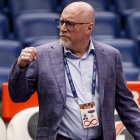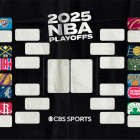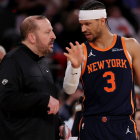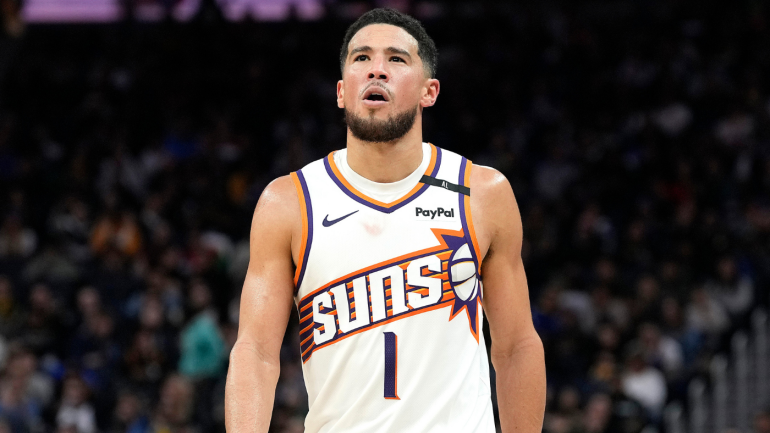
On May 1, 2024, Mat Ishbia delivered what is trending toward becoming one of the most infamous quotes an NBA owner has ever given. "Ask the other 29 GMs -- 26 of them would trade their whole team for our whole team and our draft picks and everything as is," Ishbia said, mere days after his Phoenix Suns were swept out of the first round of the 2024 postseason. "The house is not on fire. We're in great position. It's not hard to fix. It's not like we're like, 'Hey, we don't have enough talent to win a championship.' We have enough talent to win a championship."
Imagine the bravado of Joe Lacob's "lightyears ahead" quote with none of Golden State's achievement to back it up. That was, essentially, Ishbia's approach to his end-of-season press conference less than one year ago. It was ambitious to say the least in the moment. Looking back, it bordered on delusion. Despite reasonably healthy seasons from everyone but Bradley Beal, despite an offseason widely viewed as successful under the circumstances, and despite the hiring of a third big-name coach in three seasons, Phoenix's season ended on Sunday without so much as a Play-In Tournament berth to show for it. Instead of preparing for a postseason matchup on Monday, the Suns fired Mike Budenholzer and will now search for a fourth head coach in as many seasons.
Looking at it now, you might have a hard time finding three GMs who would swap their situation for Phoenix's. The Suns control none of their own first-round picks through 2031, and very few of their incumbent young players seem all that promising. They have perhaps the most untradable contract in the NBA in Bradley Beal and may be stuck above the second apron again next season. There is no defense here to speak of, and more distressing is that despite all of that talent Ishbia boasted of, Phoenix has just barely cracked the top 10 in offense in his two full seasons of stewardship.
This season may have proven all of that, but it was mostly apparent a year ago. Despite Ishbia's comments, the house really was on fire a year ago, and if it wasn't, it's at least been ablaze for the last few months. Ishbia's recent comments to ESPN's Tim MacMahon that the Suns could "pivot and reload" amount to calling the fire department when your house is already a smoldering pile of ashes. There's no fixing this team at this point. It has to be rebuilt from the ground up.
What does a KD trade look like?
That starts, of course, with a Kevin Durant trade. The Suns, to their credit, don't seem to be shying away from one in the same way they did in June, when Ishbia responded to rumors surrounding the Houston Rockets by saying "Phoenix loves Kevin Durant and Kevin Durant loves Phoenix, and we are competing for a championship this year because we have the team to do it." A Durant trade felt inevitable the moment the Suns shopped him to Golden State at the deadline, but it comes with two significant questions attached.
The first: What sort of return Durant would generate entering his age-37 season? There's no clear answer here, no precedent to fall back on because very few 37-year-olds have ever been this good and most of the ones who have been weren't traded. Of the 22 players ever chosen to an All-Star Game at age-36 or later, only two were traded afterward. Neither is a reliable template here. Shaquille O'Neal was dealt for practically nothing in 2009. Kevin Garnett was on the other end of the spectrum in 2013, going to Brooklyn in the trade that got the Celtics Jayson Tatum and Jaylen Brown. Of course, he was traded alongside Paul Pierce in that deal, and it's widely regarded as one of the worst trades in NBA history, not exactly a move teams want to emulate. We truly don't know what a 37-year-old star on an expiring contract is worth on the modern trade market.
The second is just how much the Suns would lose by not having Durant. Despite all of the factors that might limit his trade value, Durant is still a very, very good basketball player. Statistically speaking, he was easily the best one the Suns had this season. He led the team in scoring, blocks and every meaningful all-in-one metric. He ranked third on the team in assists and fourth in rebounds while coming just a hair short of his third 50-40-90 shooting season. Only Steve Nash has more. As necessary as a Durant trade is, it won't be one that guarantees short-term improvement. Replacing Durant, even at this stage of his career, will extremely difficult given the assets Phoenix has remaining and the ones they should expect to receive in exchange for him.
So Phoenix already has a sub-.500 roster. That roster loses its best player the moment Durant gets traded, and because of his age, injury history and the possibility that he uses his expiring contract to force his way somewhere specific, it's somewhere between uncertain and unlikely that Phoenix gets a substantial enough package back for him to fix everything else that is wrong here. They have minimal draft capital to use in other moves, and none of their role players would fetch much back in their own trades. If there is any sort of pivot and reload path here that results in the Suns contending in the near future, it certainly isn't obvious on paper.
Why Booker should be on the block, too
Which brings us to the lone Suns star we haven't mentioned yet. Devin Booker almost unquestionably has more trade value than Durant just by virtue of his age. That age is not, however, an infinite runway. Booker is 28, not 23. He's probably at or near his peak today. He'll likely remain there for at least another few years. But he is probably going to start getting worse faster than the Suns would hope. Faster, almost certainly, than they can turn around the team with few assets, little incumbent talent and practically no financially flexibility.
When MacMahon broached the topic of Booker's possible availability, Ishbia immediately squashed the concept of a trade. "Never happen," he said. "It's silly. So here's what I'll tell you: I have Devin Booker in the prime. In order to win an NBA championship, you got to have a superstar. You got to have a great player."
Ishbia is right about one thing. You do need to have a great player in order to win championships. Durant certainly qualified in his prime. But does Booker? He's been selected to two All-NBA Teams in his career, a third-team pick last season that was predicated on a number of superior players failing to reach 65 games, and a more deserving First-Team pick in 2022. The all-in-one metrics aren't a fan, at least relative to his reputation. He ranks 80th in Win Shares per 48 minutes, for instance, and has never ranked higher than 18th. His BPM peak was 20th. In VORP it's 17th. In most seasons, he's a good deal lower.
All but three of the champions crowned this century employed a reigning or former MVP winner. Booker has one fourth-place finish to his name. Other than the 2021-22 season in which he received it, he has never garnered a vote. The outliers here are the 2004 Pistons, who have never been replicated and whose historic defense is more or less the opposite of Phoenix's unit on that end of the floor, the 2019 Raptors, who may have had an MVP winner if Kawhi Leonard had ever stayed healthy to compete for one, and the 2024 Celtics, who were led by a three-time reigning First-Team All-NBA pick in Jayson Tatum while having arguably the deepest top six in NBA history. Being the best player on a championship team is an enormously high bar to clear. Remember, a year ago, there were doubts that even Tatum could do it. Good luck finding someone outside of Arizona who believes Booker is on Tatum's level as a player.
Generally, it takes a top-five player, perhaps even a top-three player, to win a championship. Booker is... probably in the top 20? Maybe in the top 15? Certainly not in the top 10. If he's the second-best player on a deep and versatile roster, you're probably ready to contend. That's more or less the formula the 2021 Suns rode all the way to the Finals. Booker was that team's leading scorer, but Chris Paul led the team in every meaningful metric, was the only member of the team to earn All-NBA honors and finished fifth in MVP voting. Even that team needed quite a bit of help to make the Finals. They beat the Lakers without Anthony Davis in the first round, the Nuggets without Jamal Murray in the second and the Clippers without Kawhi Leonard in the third.
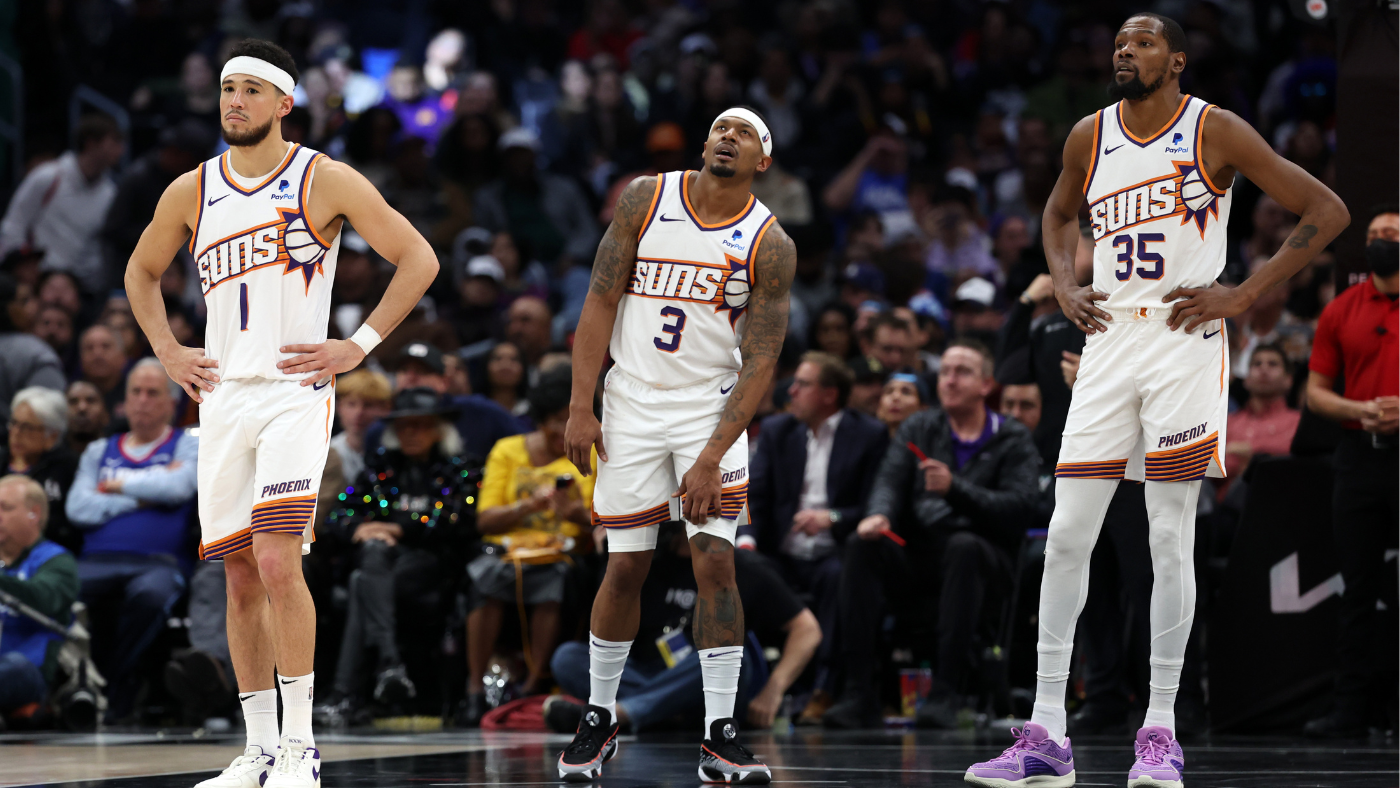
So the idea here is probably to pair Booker with someone as good or better than him while absolutely nailing the margins. Phoenix tried the first part by trading for Durant. They whiffed on the second by giving up everything else they had for Beal and making a disastrous deal for Jusuf Nurkić. Now they're starting from scratch with a ticking clock. Booker turns 29 on Oct. 30, right around opening night of next season. Executing this plan, under the absolute best of circumstances, will take several years. More likely, it just isn't plausible given the asset limitations we've covered.
To put it plainly, there's no way out here. There's no pivot and reload that positions this decimated Suns team to compete with the Thunder and the Spurs and the Lakers in the near future. Despite Ishbia's all-in mantra, it's time to back all the way out. It's time to trade Booker.
What would a Booker trade look like?
The unfortunate thing here is that trading Booker alone doesn't automatically right the ship. You'll hear plenty of people clamor for the Suns to trade Booker to the Houston Rockets, specifically, because the Rockets control Phoenix's first-round picks in 2027 and 2029. By getting them back in a Booker deal, Phoenix would regain the ability to tank. The trouble here is that Houston only controls three Phoenix picks (with 2025 included, though to the Suns it is no different than any other late lottery pick). Washington controls three more in 2026, 2028 and 2030, albeit through swap rights. Utah controls another in 2031. Their 2032 pick is frozen because of the second apron. This isn't a one-trade rebuild. Every version of whatever Phoenix does next includes losing out on most of their own future picks. They can perhaps carve out specific years to tank, but they can't do so indefinitely without giving away as many top picks as they keep.
But those picks are, sadly, a sunk cost. Giving great picks to the Wizards, the Rockets and/or the Jazz is painful, but it doesn't ultimately hurt them. What will hurt them, though, is continuing to pretend that the Booker era is salvageable. They can either watch him get older and less valuable on a middling team, or they can act now and try to take advantage of the best asset they have to try to build something new.
What exactly that "something new" turns out to be would be a bit of a mystery. The Suns would probably need to hire a new general manager to figure that out, and it would probably require a few years in the wilderness as whatever young players Booker and Durant return in trades mature into the cornerstones of whatever comes next. In that time, the Suns could clean up their books and supplement that young talent with free agents and smaller trade additions. It would be a slow build, far slower than Ishbia, who traded for Durant the week he took over the team, could probably tolerate. But it would be better than whatever the last few years have been, because truly, they could not possibly have gone worse.
This would be the best course of action for the Suns. It's also, probably, the least likely. "For better or worse, there's no 'trust the process' to Mat Ishbia," one Suns source told MacMahon. Booker, by all accounts, wants to be in Phoenix. Ishbia, by his own account, wants Booker to remain. Nobody in this equation is being honest with themselves if they believe that partnership is leading to a championship any time soon, but nothing the Suns have done under Ishbia suggests they have the sort of self-awareness needed to ever meaningfully compete for one. Barring something unforeseen, the Suns will just be a different flavor of mediocre next season.
![[object Object] Logo](https://sportshub.cbsistatic.com/i/2020/04/22/e9ceb731-8b3f-4c60-98fe-090ab66a2997/screen-shot-2020-04-22-at-11-04-56-am.png)










